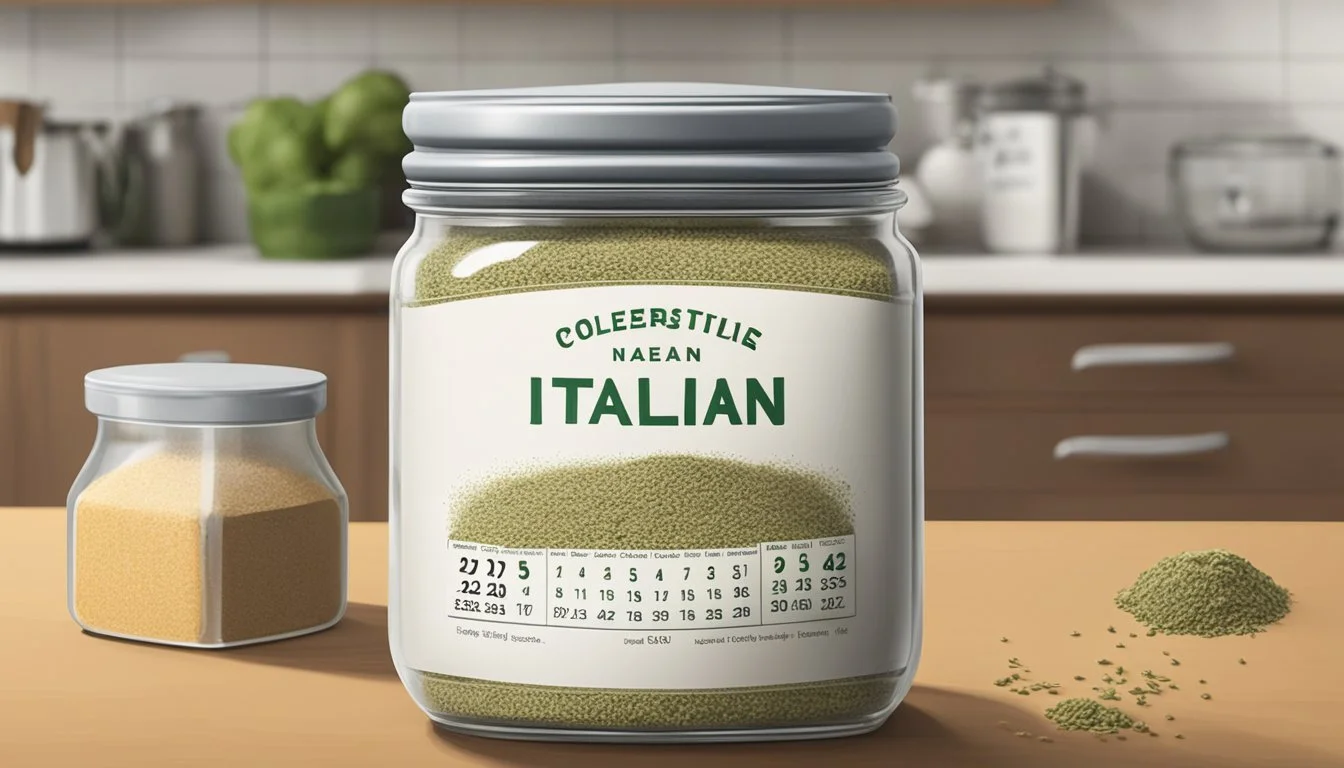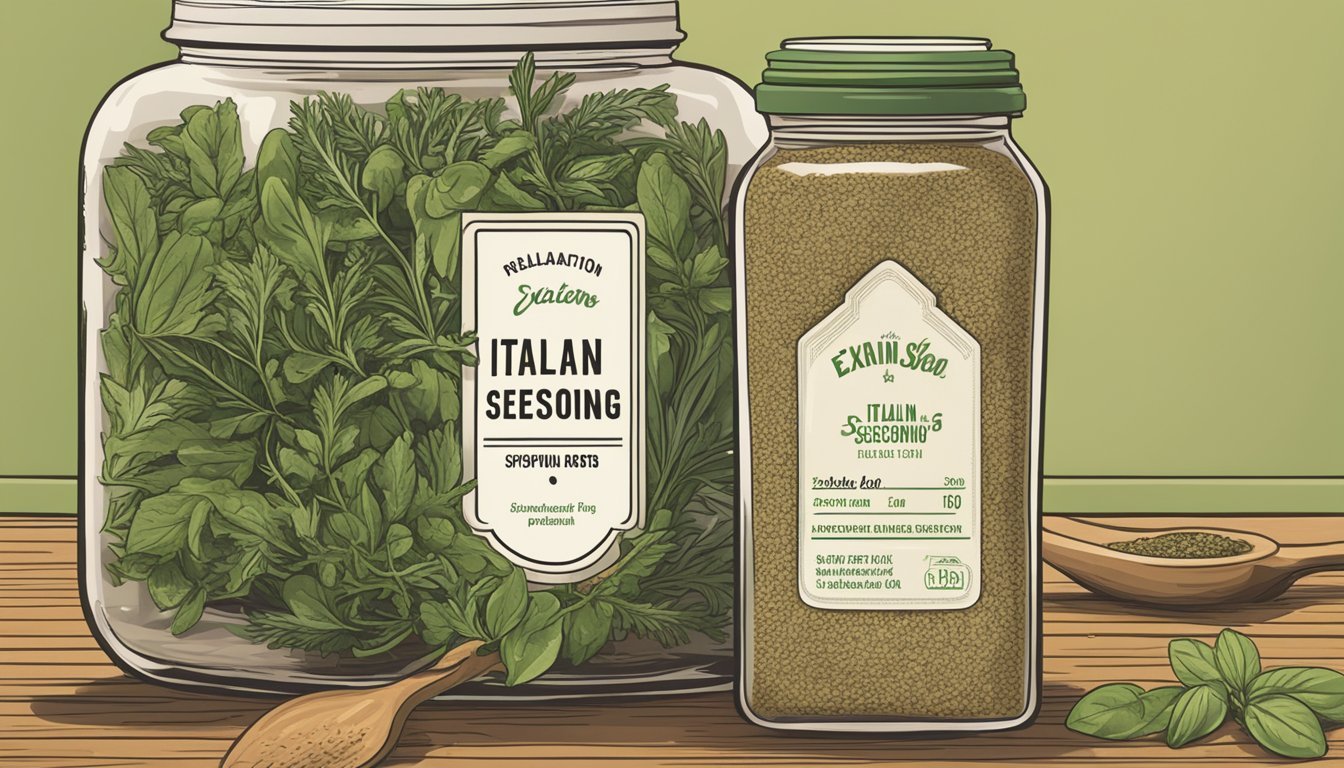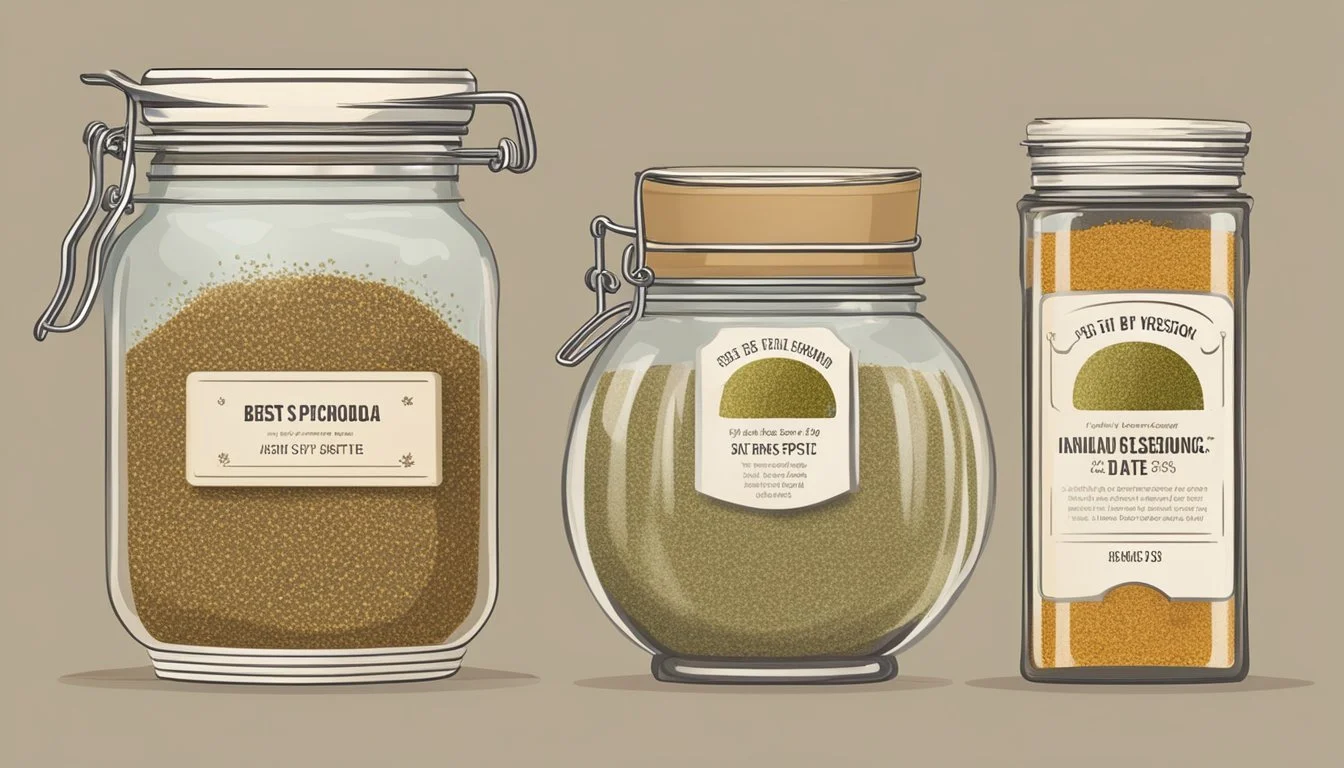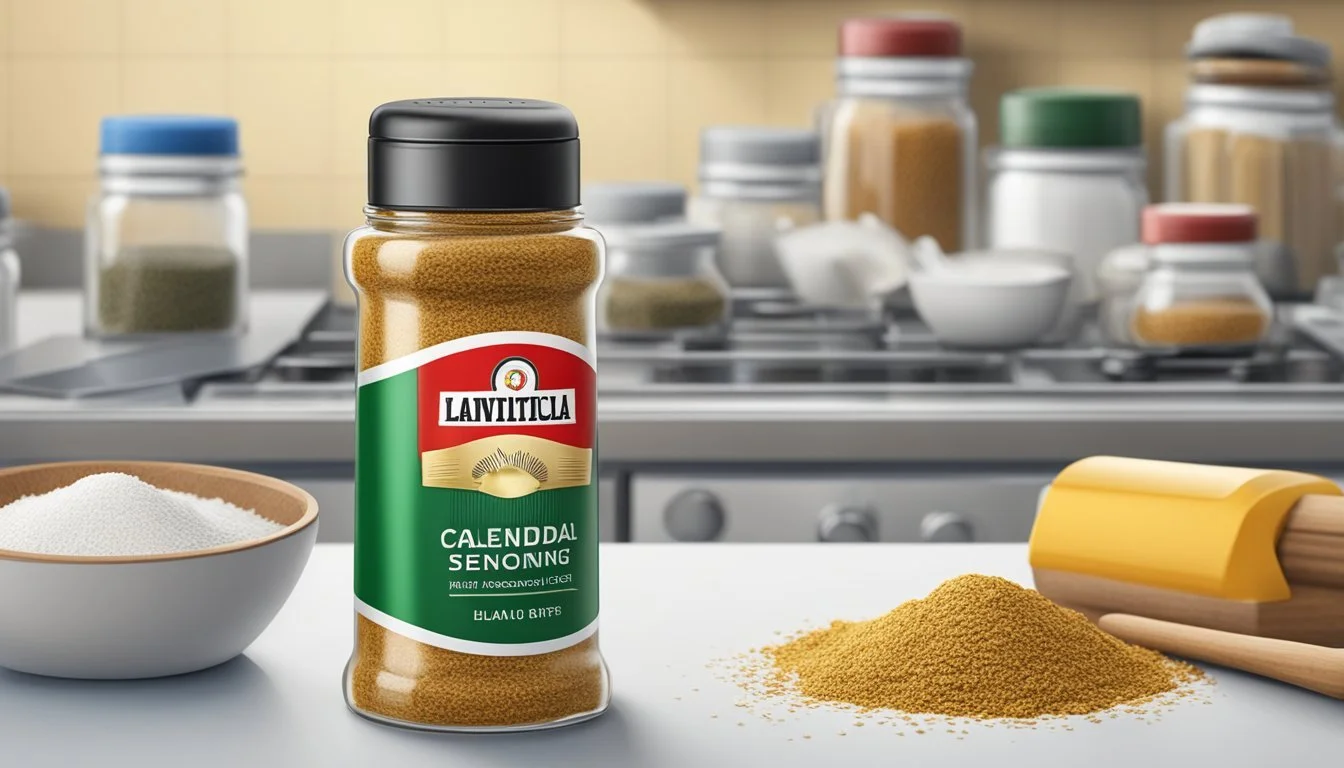Does Italian Seasoning Expire?
Shelf Life and Storage Tips
Italian seasoning, a versatile blend of herbs and spices, can add a burst of flavor to various dishes. Home cooks often wonder if this staple pantry item can go bad. Italian seasoning does expire, though its shelf life varies significantly depending on whether it's freshly made or store-bought.
Freshly made Italian seasoning typically lasts for 1-2 weeks when stored in the refrigerator. In contrast, pre-packaged Italian seasoning can maintain its quality for up to 2 years if stored properly. Proper storage involves keeping the seasoning in containers with tight-fitting lids and in a cool, dark place to preserve its potency and flavor.
When using Italian seasoning, always trust your senses. If the aroma has faded or the color seems off, it might be time to replace it. Storing your spices correctly ensures that your dishes continue to benefit from their full flavor potential.
Understanding Italian Seasoning
Italian seasoning is a versatile blend made from a mix of aromatic herbs and spices. It's a staple in many kitchens, adding a depth of flavor to various dishes such as pasta, pizza, and marinades.
Composition of Italian Seasoning
Italian seasoning typically consists of oregano, basil, rosemary, thyme, and marjoram. Some variations may also include parsley and sage. These herbs are dried and mixed together to create a balanced flavor profile.
Oregano: Earthy and slightly bitter, often used in tomato-based dishes.
Basil: Sweet, with a minty undertone, essential in Italian cuisine.
Rosemary: Pine-like and aromatic, it adds a strong flavor.
Thyme: Subtle and slightly sweet, common in savory dishes.
Marjoram: Sweet and mild, often compared to oregano.
This combination provides a harmonious blend that enhances various recipes.
Culinary Uses and Benefits
Italian seasoning is popular in many recipes due to its convenience and consistent flavor. It is commonly used in pasta sauces, pizza toppings, and as a seasoning for meats and roasted vegetables.
Pasta and Pizza Toppings:
Adds depth to tomato sauces and pasta dishes.
Enhances the flavors of pizza toppings.
Marinades and Soups:
Makes an excellent addition to marinades for chicken and beef, imparting a rich, herbal flavor.
Works well in soups and stews for an aromatic taste.
Health Benefits:
Rich in antioxidants due to herbs like oregano and rosemary.
Can contribute to heart health and improved digestion.
Italian seasoning simplifies cooking by providing a ready-made blend that can easily be added to dishes. This makes it a valuable ingredient for both novice and experienced cooks.
The robust flavors, combined with its health benefits, make Italian seasoning a staple in many kitchens.
Shelf Life and Freshness
Italian seasoning's shelf life and its freshness over time are influenced by its ingredients and storage methods. Fresh herbs like basil, oregano, and thyme lend their aromatic properties, while dried versions of these herbs offer longer-lasting potency.
Typical Shelf Life
Dried Italian seasoning can generally maintain its best quality for 2 to 3 years, especially when stored in airtight containers. The shelf life of pre-packaged blends often depends on the expiration date of the individual spices included.
Freshly made Italian seasoning made from fresh herbs will last for a significantly shorter period—typically 1-2 weeks in the refrigerator. The freshness diminishes much quicker due to the natural moisture content of fresh herbs.
Proper storage methods include keeping it away from heat, light, and moisture. Airtight containers with tight-fitting lids can help maximize its aromatic qualities over time.
Determinants of Freshness
Several factors determine the freshness of Italian seasoning. The potency and aroma of dried herbs decrease over time, even if technically safe to use after the expiration date. Key indicators of freshness include:
Color: Fresh dried herbs retain a vibrant color. If the seasoning looks dull, it's likely lost some potency.
Aroma: A strong, pleasant smell indicates good quality. If the scent is faint, the seasoning might be past its prime.
Flavor: Testing for flavor potency in a small amount of food can provide a quick assessment.
Storage conditions significantly impact freshness. Keeping Italian seasoning in cool, dry places away from direct sunlight aids in maintaining its flavor and aromatic properties. Using airtight containers can also prevent exposure to air, which can degrade the herbs faster.
Proper Storage Techniques
Knowing how to store Italian seasoning properly helps maintain its flavor and extends its shelf life. Following specific guidelines ensures your seasoning remains as fresh and potent as possible.
Ideal Storage Conditions
Italian seasoning should be kept in an airtight container. This preserves its flavor by preventing exposure to air. Store the container in a cool, dark place such as a cupboard or pantry. Ideally, it should be placed away from heat sources like ovens or stovetops, which can degrade the spices. Light and moisture are also detrimental and can cause the seasoning to lose its potency or spoil. A drawer can be another good option as it typically remains darker and cooler compared to spots that are more exposed.
Factors to Avoid
There are several factors to avoid to ensure the best storage of your Italian seasoning. Avoid exposing the container to direct sunlight, as it can cause the spices to lose their vibrant color and flavor. Heat is another significant factor to watch out for. Keeping the seasoning away from heat sources like ovens and microwaves is crucial. Moisture is particularly damaging since it can lead to clumping or mold development. Always use dry utensils when reaching into the container to prevent moisture from getting inside. Air exposure is also harmful, so always ensure the container is tightly sealed after each use to prevent the seasoning from quickly losing its potency.
Assessing Quality Over Time
Italian seasoning, when stored correctly, can last for years. Determining its quality involves checking visual appearance and aroma, as well as conducting a simple taste test.
Visual and Aromatic Clues
Examining the color of the Italian seasoning is crucial. Fresh blends maintain vibrant hues, while those past their prime may look dull or faded. Ensuring no mold or unusual particles is also essential.
The aroma is another key indicator. Fresh Italian seasoning should release a robust, distinct smell. If the scent is faint, the seasoning has likely lost its potency. Compare the aroma to a fresh batch if unsure.
Taste Test
A quick taste test helps to determine if the seasoning still has its expected flavor. Take a small pinch and sprinkle it on food. Fresh Italian seasoning will impart a strong, harmonious taste, while aged seasoning may require more to achieve the same flavor.
Noticing any stale or off-tasting elements signifies the seasoning might be past its optimal freshness.
When to Replace Italian Seasoning
Italian seasoning, like other dried herbs, loses potency over time. The typical shelf life is around one to three years.
Signs to Replace:
Loss of Aroma: If Italian seasoning no longer gives off a strong aroma, its flavor won't be as impactful.
Color Fade: Dull, faded herbs indicate diminished potency.
Clumping: Moisture can lead to clumping, suggesting it's time to replace your seasoning.
Expiration Dates:
Store-bought blends: Typically labeled with expiration dates for optimal freshness.
Homemade mixes: Should ideally be used within six months to a year for the best flavor.
Tips for Home Cooks:
Store Italian seasoning in a cool, dry place away from direct sunlight and heat.
Airtight containers: Ensure minimal exposure to air to preserve potency.
Here's a quick reference table:
Condition Action No strong aroma Replace Herbs look faded Replace Clumping Replace Beyond expiration Replace
Regularly checking your Italian seasoning will ensure your dishes always have the best flavor impact.
Maximizing Flavor in Cooking
Utilizing both freshly prepared Italian seasoning and homemade blends can significantly enhance the flavor profile of various dishes. By understanding how to incorporate these elements, one can bring out the best in their culinary creations.
Enhancing Recipes with Freshness
Using fresh herbs and spices can elevate any recipe. Freshly made Italian seasoning, though it has a shorter shelf life, offers a more vibrant and potent flavor. Dried herbs like basil, oregano, and thyme should be crushed or rubbed before use to release essential oils.
Ground spices, while convenient, lose potency over time. For optimal flavor, storing Italian seasoning in airtight containers and using it within 2 to 3 years is recommended.
Creating Homemade Blends
Creating a homemade Italian seasoning blend allows for customization and control over flavors. The basic blend usually includes basil, oregano, rosemary, thyme, and sometimes marjoram. By experimenting with ratios, one can create a seasoning that compliments specific recipes or personal taste preferences.
Blending these spices at home ensures maximum freshness. Store the blend in an airtight container, away from light and heat, to retain its flavor and aroma for as long as possible.
Health and Dietary Considerations
When it comes to Italian seasoning, there are important aspects to consider for those with specific dietary needs and health goals.
Nutritional Content
Italian seasoning primarily consists of dried herbs such as basil, oregano, and thyme. These herbs contain essential vitamins and minerals, though in small quantities due to the amounts typically used in cooking.
Allergy-Friendly Blends
Most Italian seasoning blends are naturally gluten-free, which is critical for individuals with celiac disease or gluten sensitivity. It's always advisable to check the labels for any potential cross-contamination warnings.
Salt-Free Alternatives
For those monitoring their sodium intake, there are low-sodium or salt-free versions of Italian seasoning available. These allow the consumer to control the amount of salt added to their dishes, promoting a healthier diet without sacrificing flavor.
Health-Conscious Choices
Consumers can opt for organic or preservative-free blends. These alternatives may appeal to individuals focused on reducing chemical intake and consuming more natural products.
Usage in Cooking
Italian seasoning is versatile and can be used in a variety of dishes, from pasta sauces to salad dressings, ensuring that these meals can be flavorful without adding excessive unhealthy ingredients.
Benefits of Herbs
The herbs in Italian seasoning contain antioxidants and anti-inflammatory compounds. While the nutritional benefits might be minimal in small amounts, they can contribute to a healthier diet when used regularly as part of a balanced meal plan.





